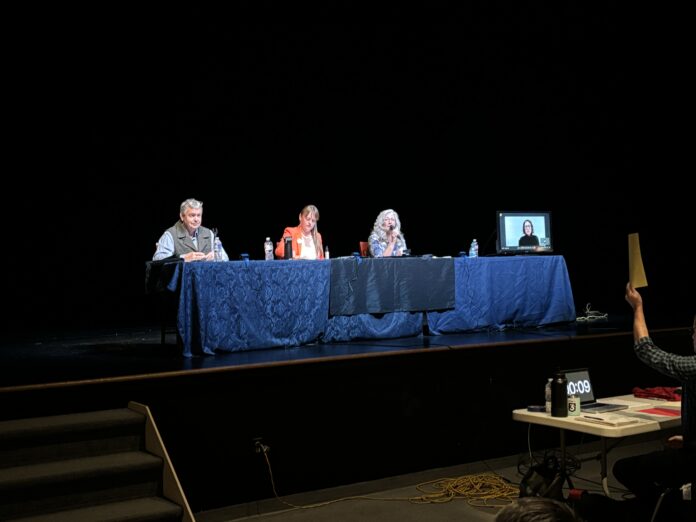An all-candidate forum took place in Creston’s Kootenay River Auditorium last night, with all four of the Kootenay Central riding candidates making an appearance.
Various topics and challenges, such as housing, the economy, and healthcare, were discussed, with each candidate getting their word out.
Three candidates, Incumbent NDP Brittny Anderson, Independent Corrine Mori, and Conservative Kelly Vandenberghe, appeared in person while BC Green Nicole Charlwood attended remotely due to illness.
Each candidate was given a chance to respond to questions issued by the moderator.
First, they were asked how their party plans to address drug addiction in Creston and the Kootenay Central riding.
Vandenberghe says it is a real problem, especially in Nelson.
“The Conservative Party would like to deal with this type of program through addiction recovery by offering a prevention program to end decriminalization, stopping legal drug use, and stopping the addiction before it starts.”
He added that they plan to put “Christian’s Law” into effect, where any parent can take their child in for involuntary treatment.
Charlwood stressed that drug use is a health and social issue, not a criminal one.
“It is clear that punitive measures such as prohibition fail to foster a safe and healthy society,” said Charlwood.
“We hear a lot about involuntary care, but what we really lack is voluntary care and the support services that people who are facing complex crises need.”
Meanwhile, Mori says she wishes for the government to take a step back from offering a safe supply of drugs.
“If you want to stop the devastation, you need to stop the supply of drugs from our government to people who end up being devastated through addiction and death. The overdose death rate has tripled since the implementation of this plan. It doesn’t work.”
Anderson says the NDP has been working on a system of support for those who need it.
“We’re trying to catch people before they end up in crisis,” explained Anderson.
“We’re providing them funding and support so that they’re able to get jobs early and contribute in their communities.”
The candidates were then asked how they plan to help improve the health-care situation in Creston.
Mori says the province needs to do away with the bureaucracy limiting BC’s healthcare system.
“We have a mass exodus of health-care professionals outside of this province because of new legislation that has come down. The Health Care Professions Act is very punitive and dictatory to professionals in terms of if you do not comply with everything the government tells you, you now will be subject to jail time and hundreds of 1000s of dollars in fines.”
She says there is an overabundance of management, with a lack of focus on what provision of care is.
Charlwood says her party plans to build health centres to help get medical support to those who don’t have access to a doctor.
“Green’s approach is to prioritize building community health centres to increase access, lower bureaucratic barriers for healthcare professionals and offer robust preventative and primary mental health care. Every British Columbian should have a home for the majority of their care and have access to doctors, nurses, mental health professionals and specialists like dieticians and physio all within our communities.”
Vandenberghe says the current model results in inefficiencies and long wait times.
“It’s universal health care for everyone under a single-payer system that delivers care throughout public and non-government facilities with direct funding to the front lines. Stop ER closures, transparent and accountable BC health Care in reporting patient outcomes, health services, performance reviews, and modernized healthcare technologies. We have to start reducing the long wait times in emergency rooms.”
Meanwhile, Anderson raised concerns with Vandenberghe’s answer.
“What concerns me with Kelly’s response is it sounds like the conservatives want us to pay for health care. I will fight every day to make sure we have a strong public health care system,” explained Anderson.
She says they have identified the major issues in the system right now, such as healthcare, transportation, and transportation for health Care.
“We are building hospitals. We are hiring more doctors and nurses than any other province. We’re attaching more people by the end of 2025 on the trajectory, we should have every person that’s on that list attached to either a doctor or a nurse practitioner.”
With housing being an ongoing issue in Creston, the candidates were then asked how they would go about addressing it.
Mori says overregulation is slowing things down and overcomplicating things.
“We need to stop overregulating things. We can come up with simple builds that don’t require massive engineering. This has escalated all the requirements around engineering, and we can come up with simple structures to get people into the housing market. But not only that, we need to start focusing on rent-to-own programs. It is not good enough that we are just creating a housing market where people are forced into perpetual tenancy.”
Vandenberghe says he can’t disagree with a lot of Mori’s answer.
“Conservatives would like to offer some solutions, removing some of the NDP taxes on housing. We want to create a civic infrastructure and renewal fund; billions of dollars per year for municipalities. Put in a rent to to help those people with renter and homeowner rebates. And that’ll be rolled out on a budget in 2026 to approve homes in months, not years. We must conduct a forensic audit of BC housing, including relationships with politically connected nonprofits. There must be red tape reduction.”
Anderson says the Conservatives did little to help the housing crisis when they were in power and questions what they would do now.
“We had a ton of foreign investment drive up homing prices. People were flipping. There was speculation all over the place, and now we are feeling that crunch here today. We are building. David Eby is being celebrated across North America for his plan to build housing for people, we are using every tool in the toolbox.”
She adds their movements against Airbnb shows the NDP’s efforts to curb vacancy rates.
Charlwood says BC isn’t just facing a housing crisis, it’s a crisis of equality.
“Housing has become predominantly a way to make money, and very little of what is available is affordable. Yet we deserve safe, secure and affordable housing because of decades of underinvestment in public-supported housing, including wraparound services,” explained Charlwood.
“BC should be the best place to live, not just for investors, but for everyone as a human right. We need real solutions to prioritize secure, affordable housing for all of us.”
The candidates were also asked how they would support local businesses in recruiting, training and retaining employees.
Vandenberghe says the focus must be put on growing the private sector.
“Once again, it’s back to the red tape. You’ve got to reduce that. Supporting small businesses and entrepreneurs is critical. Reducing the small tax on their business, and cracking down on crimes, not so much here, but in else elsewhere is very important. Target cities to reduce approval times for building permits and business licenses. We’re going to cut the carbon tax.”
Charlwood says small businesses are struggling to invest in themselves while worrying about rent, rising costs, and uncertainty with consumers’ ability to afford their products.
“What we know is that there is a growing demand for incentives beyond financial compensation, with many workers seeking better work-life balance with support for child care and increased leisure time. Specific policy announcements that we have include creating sustainable career opportunities and workforce development, introducing a careers program for the food, beverage and hospitality sector, and providing job seekers with training, mentorship and job placement in British Columbia’s food manufacturing and hospitality businesses.”
Anderson says the NDP will support local farmers.
“We are ensuring that locals are able to the local farmers are able to get access to land. If you have land that you want farmed, or if you’re someone who is looking to farm but doesn’t have access to land, it is a free service, kind of like a matchmaking service. Well, we’ll find the right farmer for the right land. We’re also supporting agriculture. There’s a ton of support for agriculture that we’ve been providing, and then there’s more to come in our platform.”
Mori says there is an issue with how the minimum wage is administered and that it is limiting small businesses.
“Minimum wage needs to be a graduated program that when you are coming into just learning how to work, and you’re still in training, there should be tiers of how much you get paid so that the employer is actually getting good value from the money that they’re spending.”
Another key topic brought up was the carbon tax and each party’s future decisions regarding it.
Vandenberghe says he doesn’t believe the carbon tax is effective.
“I don’t think it’s doing what it was intended to do. It is a collection. It’s paying for the the use of hurting fossil fuels, essentially, but it’s ignoring what industry and technology are doing out there today. It’s it’s making it economically impossible for us to get ahead. It’s keeping us poor.”
Anderson says it has been an effective tool, especially in regard to large industries.
“It is a conservative economic tool that puts a price on pollution, and it has been an effective tool, particularly when you look at large industry,” explained Anderson.
“We’re able to get forced industry to shift and to change and to lower their emissions, I believe we are succeeding because climate action is real.”
However, Mori says the carbon tax is a plague on the everyday taxpayer.
“They basically admitted that the big industrial players aren’t actually paying this tax. It’s you.”
“It is making the cost of our energy source unaffordable. The requirements to have to change heating systems to be efficient electric is prohibitive. It’s not possible for most homeowners. We don’t have enough contractors to install these systems clean. Rebates are not adequate. We don’t even have the supply to meet the demand.”
Charlwood says that the carbon tax has been applied unfairly.
“The fossil fuel industry was responsible for 14.8 million tons of emissions in 2021 and, under the current model of the carbon tax, most of these emissions were exempt from the carbon tax, despite what Brittny Anderson has said. The BC Greens would ensure that these emissions were treated the same as all other emissions in British Columbia: the revenue from these taxes will continue to be rebated to British Columbians who are already paying the price for climate change.”
Be the first to know! Don’t miss out on breaking news and daily updates in your area. Sign up to MyCrestonNow News Alerts.




